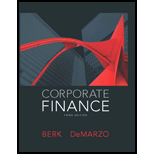
Concept explainers
Suppose an H1200 supercomputer has a cost of $200,000 and will have a residual market value of $60,000 in five years. The risk-free interest rate is 5% APR with monthly compounding.
- a. What is the risk-free monthly lease rate for a five-year lease in a perfect market?
- b. What would be the monthly payment for a five-year $200,000 risk-free loan to purchase the H1200?
a.
To determine: The risk-free monthly lease rate payment in a perfect market.
Introduction: Lease is a contract between the lessee and lessor for the use of an asset. Lessee agrees to pay a specific amount as per contract to the lessor for the use of the lessor asset.
Answer to Problem 1P
Explanation of Solution
Given information:
Supercomputer cost: $200,000.
Lease term: 5 years.
Lease payment period:
Residual market value: $60,000.
Risk free interest rate: 5.00%
Formula for the calculation of present value of the payment:
Formula for the calculation of the monthly lease payment in perfect market:
Calculate the present value (PV) of the lease payment:
Therefore, the PV of the lease payment is $153,248.60.
Calculate the monthly lease payment in a perfect market:
Lease payment remains for 59 payments that are paid as an annuity because the first lease payment is paid in upfront.
Therefore, the monthly lease payment in a perfect market is $2,880.02.
b.
To determine: The monthly payment for a five-year risk free loan.
Answer to Problem 1P
Explanation of Solution
Given information:
Lease term: 5 years.
Lease payment period:
Interest rate: 5.00%.
Formula for the calculation of the monthly lease payment:
Calculation of the monthly payment for a five-year risk free loan:
Therefore, the monthly payment for a five-year risk free loan is $3,774.24.
Want to see more full solutions like this?
Chapter 25 Solutions
Corporate Finance
- No ai ..??10. A retirement account earns an annual interest rate of 5%. If you contribute $4,000 per year for 6 years, what will be the total value of the account after 6 years?arrow_forward10. A retirement account earns an annual interest rate of 5%. If you contribute $4,000 per year for 6 years, what will be the total value of the account after 6 years? give me solution..,??arrow_forwardNo AI If an investment grows from $2,000 to $2,500 in three years, what is the compound annual growth rate (CAGR)?arrow_forward
- A bond has a face value of $1,000 and a coupon rate of 6%. What is the annual interest payment?need help!!arrow_forward7. If an investment grows from $2,000 to $2,500 in three years, what is the compound annual growth rate (CAGR)? no gpt correct answer no ai ..,??!arrow_forwardA bond has a face value of $1,000 and a coupon rate of 6%. What is the annual interest payment?arrow_forward
- 8. A loan has an annual interest rate of 8% and a principal amount of $15,000. What is the interest payment for the first year? no ai correct answer...??arrow_forward1. If a stock's price increases from $50 to $60, what is the percentage change? no ai gpt..??arrow_forward10. A retirement account earns an annual interest rate of 6%. If you contribute $3,000 per year for 5 years, what will be the total value of the account after 5 years? Let me know..??arrow_forward
- 10. A retirement account earns an annual interest rate of 6%. If you contribute $3,000 per year for 5 years, what will be the total value of the account after 5 years? No directly answarrow_forward1. If a stock's price increases from $50 to $60, what is the percentage change?need help!!!arrow_forward2. A bond has a face value of $1,000 and a coupon rate of 6%. What is the annual interest payment? no ai gpt..??arrow_forward
 EBK CONTEMPORARY FINANCIAL MANAGEMENTFinanceISBN:9781337514835Author:MOYERPublisher:CENGAGE LEARNING - CONSIGNMENT
EBK CONTEMPORARY FINANCIAL MANAGEMENTFinanceISBN:9781337514835Author:MOYERPublisher:CENGAGE LEARNING - CONSIGNMENT Intermediate Financial Management (MindTap Course...FinanceISBN:9781337395083Author:Eugene F. Brigham, Phillip R. DavesPublisher:Cengage Learning
Intermediate Financial Management (MindTap Course...FinanceISBN:9781337395083Author:Eugene F. Brigham, Phillip R. DavesPublisher:Cengage Learning


